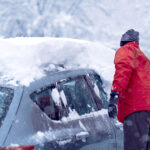Hurricanes are terrible, frightening things, as Florida residents battered by Hurricane Charley are finding out once again.
As they do every spring and summer the National Oceanic Atmospheric Administration, the Federal Emergency Management Administration, insurers and insurance industry associations this year issued notices and warnings to residents of hurricane-prone coastal states to take precautions in advance of the season. Tropical storm experts forecasted a 71 percent chance of a major hurricane hitting the U.S. coastline in 2004. It took all summer for it to happen, but in one fell swoop, not only a major hurricane but a tropical storm, as well, struck Florida. While residents of Louisiana and Texas know first hand the impact a catastrophic coastal storm can have, it’s important to be reminded of things families can do to protect themselves, their homes and possessions.
Following are a few hurricane preparedness suggestions from the Chubb Group of Insurance Companies:
• Secure items that may become projectiles.
• Strengthen garage doors against high winds. In an emergency, back up your car against the inside of your garage door to strengthen the door.
• Bring indoors all patio and lawn furniture, potted plants, bicycles, toys and other loose objects.
• Awnings—make sure they are closed and secured.
• Protect interior contents, personal belongings and important documents.
• Move items away from doors and windows; stow them in cabinets or interior closets.
• Maintain an inventory of jewelry and collectibles; store in a waterproof container, an interior closet or inland safety deposit box.
• Prepare an emergency supply kit.
• Stock up on bottled water, food, clothing, first aid materials, radio, batteries and other emergency supplies. These supplies should be readily accessible and should be maintained through the end of November.
• Know the phone numbers for reporting a claim to your insurance company, and for your agent or broker.
• Create an “action plan” for an evacuation and have a predetermined destination in mind.
• All vehicles should be fueled well in advance of evacuation.
• Ask your agent to make sure your home and possessions are adequately insured before a storm hits. Be aware of the specifics of your policy, such as deductibles, the coverage amount and any special provisions.
Hopefully, one big storm for this hurricane season will be enough for Mother Nature, but you never know. So, as the Boy Scouts say, be prepared.
Until next time, happy reading!
Topics Catastrophe Hurricane
Was this article valuable?
Here are more articles you may enjoy.


 State Farm Inked $1.5B Underwriting Profit for 2025 but HO Loss Persists
State Farm Inked $1.5B Underwriting Profit for 2025 but HO Loss Persists  Ford Recalling 4.3 Million US Vehicles Over Software Issue
Ford Recalling 4.3 Million US Vehicles Over Software Issue  ‘Meaningful Decline’ in Industry Q1 Underwriting Profit Expected From Winter Storms
‘Meaningful Decline’ in Industry Q1 Underwriting Profit Expected From Winter Storms  Mexico’s Cartel Violence Could Hit Economy and Insurance Segment: AM Best
Mexico’s Cartel Violence Could Hit Economy and Insurance Segment: AM Best 


